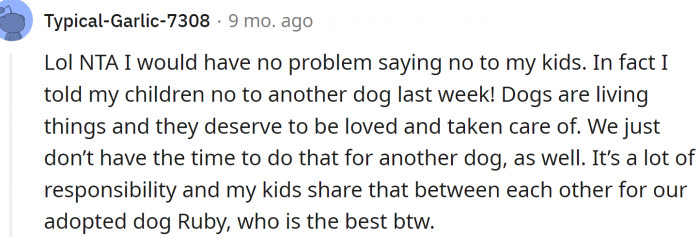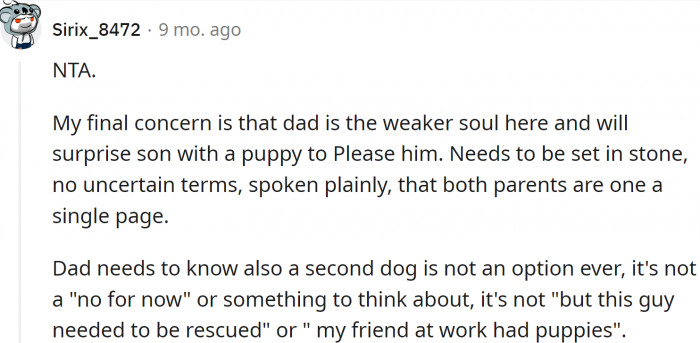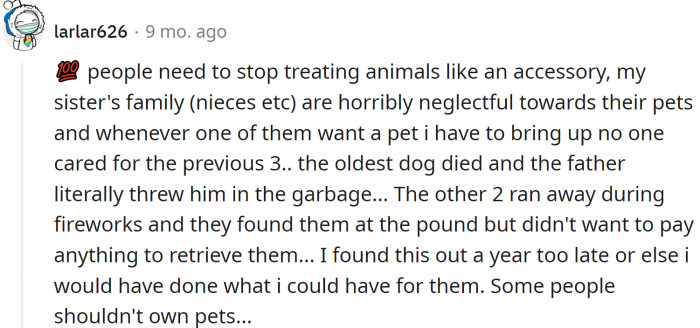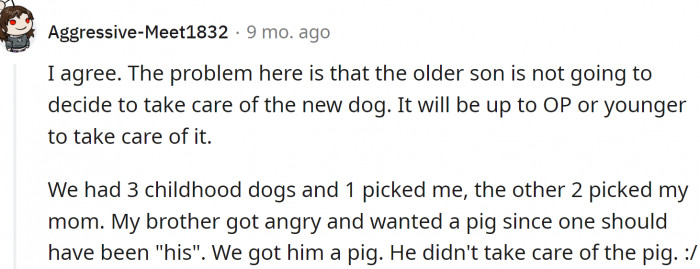Woman Refuses To Buy Her Son Another Dog Because He Neglected the First One, But Husband Wants To Appease The Spoiled Teen
Getting a family dog is a big decision. It is a living being and requires care, devotion, time, and money. But kids don’t really understand that. They often push their parents to get them a puppy because “they are so cute.”
And, of course, they promise they will take care of it, feed it, take it for walks, and clean up after it… We’ve all heard these stories.
Sadly, in most cases, kids lose interest fast, and all the chores end up on their parents’ shoulders. However, some kids won’t give up asking for another dog even though they are aware they messed up with the first one.
One Redditor asked, “AITA for telling my son he doesn’t get another dog?”
“My son begged and begged us for a dog for years. I knew he wasn't going to take care of it, and we would end up doing it, but we decided to get a family dog when he was 12 and our youngest was 10.
Our oldest lost interest after a few months and plays with Gizmo occasionally but doesn’t walk him or feed him. Surprisingly, our youngest did take care of Gizmo and handled most of the chores and training associated with having a dog. I’m quite proud of him for doing all that, seeing as he never asked for a dog.”
But now OP's older son wants a “dog of his own,” as he feels that Gizmo is stolen from him. OP said a hard NO, but her husband thinks they should buy him another dog.
Who is right here? Take a look and decide:
OP asks:

Her older son begged for a dog. And even though OP and her husband knew he wouldn't take care of it, they caved. As expected, he lost interest pretty fast.

His younger brother started taking care of the dog, and they are inseparable.

Understanding Parenting Dynamics
Parenting often involves balancing authority with empathy, which can lead to complex family dynamics. As noted by Dr. Jane Nelsen, parenting expert, "Setting clear boundaries while being emotionally supportive is crucial for fostering responsible behavior in children." This case illustrates a common tension between a parent's desire to teach responsibility and another's inclination to appease a child's emotional needs. The father's instinct to provide comfort may stem from his own upbringing and perceptions of parental roles, which could lead to conflicting approaches in parenting. According to Dr. Becky Kennedy, child psychologist, "It's important for parents to communicate openly about their values and expectations to create a unified approach."
The Consequences of Neglect in Child-Pet Relationships
Research from the Journal of Child Psychology and Psychiatry reveals that children who are given pets often develop important emotional skills such as empathy and responsibility. However, when pet care is neglected, it can lead to a lack of accountability and emotional detachment.
Dr. Alice Jung, a developmental psychologist, states that allowing children to neglect pets might inadvertently model poor emotional regulation and responsibility. This suggests that boundaries around pet ownership can be crucial in teaching children about the consequences of their actions.
Now the older brother is jealous and wants "dog of his own"

Redditors agree - don't do it

He will be leaving home soon, and OP will end up taking care of it

Moreover, studies suggest that indulgent parenting can lead to entitlement in children, where they expect their desires to be met without understanding the consequences of their actions. The American Psychological Association highlights the importance of teaching children accountability through age-appropriate responsibilities.
Practical recommendations include having open discussions about pet care responsibilities and setting clear expectations for how the child should interact with pets if a new one is introduced.
According to studies published in the American Journal of Psychology, parental decision-making on issues like pet ownership often reflects deeper values regarding responsibility and emotional attachment. When parents navigate these decisions, they are not just addressing a behavior but also shaping their child's understanding of empathy and care.
It's essential for parents to communicate the importance of responsibility in caring for pets, as this can help children develop a sense of accountability that translates into other areas of their lives.
Redditors share their experiences:

This could happen:

That's not the lesson you want to teach your kid

The Role of Emotional Regulation
Emotional regulation is vital in parenting, particularly in situations where feelings run high. According to Dr. John Gottman’s research on emotional intelligence in children, parents who model healthy emotional regulation skills significantly impact their children's ability to manage their own emotions.
In this context, the mother’s refusal to buy another dog can be seen as an opportunity to teach her son about consequences and emotional accountability. Encouraging her son to reflect on his behavior towards the first dog can foster self-awareness and empathy.
Balancing Parental Support and Responsibility
Experts emphasize the need for a balanced approach in parenting, especially when it comes to teaching children about the consequences of their actions. A study from the University of Pennsylvania highlights how active parental involvement in children's responsibilities can foster a greater sense of accountability.
Parents might consider setting clear expectations about pet care and discussing the emotional implications of neglecting responsibilities. This proactive approach can help children learn valuable life skills while strengthening their emotional intelligence.
Animals are living beings, not accessories

Stop appeasing your kids. Your job is not to give them everything they want, but to parent them and teach them

Some people don't change

Understanding the psychological underpinnings of parenting styles can also provide insight into how to navigate such disagreements. A study from the University of Michigan shows that parents often have different approaches based on their own childhood experiences and cultural backgrounds.
This highlights the importance of having discussions about shared values in parenting and finding common ground in their approaches to discipline and nurturing.
Behavioral psychologists suggest that allowing children to experience the consequences of their neglect can be a powerful teaching tool. By not immediately appeasing the child with another pet, the mother in this situation is reinforcing the idea that actions have consequences.
Research indicates that natural consequences are often more impactful than imposed ones, as they foster intrinsic motivation and personal accountability. Parents can guide their children through these experiences, helping them to reflect on their behavior and its impact on others.
That kid should try to be nicer to the dog and spend more time with it

The bottom line is:

Yes, you can win a dog's affection by being kind to it, spending quality time, and taking good care of it. Dogs don’t know who their owner in the family is – they only recognize who is good to them.
Let that be a lesson to all of you out there who are thinking of getting a family dog. You can't let someone else do all the feeding, walking, and taking to the vet, and expect that the dog will love you the most.
Exploring the Dynamics of Spoiling
Psychologists note that spoiling children can lead to entitlement behaviors, which can hinder emotional growth and resilience. A study from Harvard University indicates that children who are not taught the value of hard work often struggle with motivation and face challenges in adult relationships.
Encouraging children to work for what they want, rather than giving in to demands, helps cultivate a growth mindset, fostering resilience and perseverance in the face of challenges.
Psychological Analysis
This situation highlights a fundamental psychological issue: the balance between nurturing and teaching responsibility. Allowing a child to neglect a pet can create patterns of avoidance and entitlement, which are detrimental in the long run. It's essential for parents to guide their children in understanding the importance of caring for others, which ultimately shapes their emotional development.
Analysis generated by AI
Analysis & Alternative Approaches
In conclusion, navigating pet ownership in families can be complex and tied to broader psychological principles. Research presented by the American Psychological Association suggests that teaching responsibility through pet care can enhance children's emotional development.
By using this experience as a teaching moment, parents can help their children grow into more responsible and empathetic individuals.
Creating a Unified Parenting Strategy
A successful parenting approach often requires collaboration between partners. Research in child development emphasizes the need for consistent parenting practices, as children thrive in environments where expectations are clear and stable.
To achieve this, both parents should consider engaging in a family meeting to discuss their views on pet ownership and the responsibilities that come with it. Establishing a unified strategy can help mitigate future conflicts and set a positive example for their son.
Analysis & Alternative Approaches
Ultimately, navigating parenting challenges often requires balancing authority with empathy, which can be difficult but rewarding. Research consistently shows that teaching responsibility through meaningful consequences can lead to more well-rounded individuals.
By fostering open communication and collaboration, parents can create a nurturing environment that encourages their child's growth and emotional intelligence.



